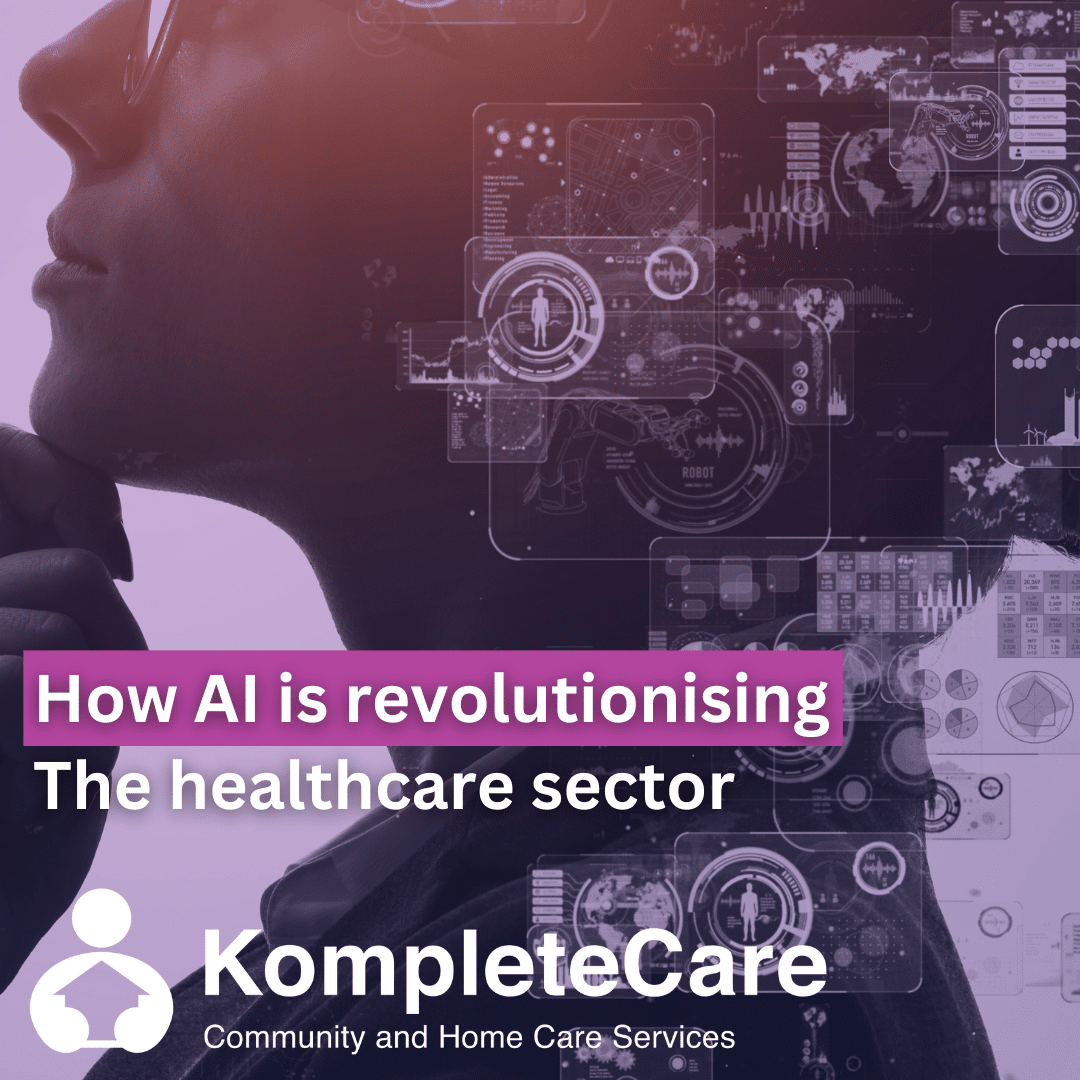The integration of artificial intelligence (AI) into the healthcare sector has been transformative, and its impact continues to grow, particularly when it comes to in-home and community-based support services.
As a leading provider, KompleteCare has seen firsthand how AI is enhancing the quality and accessibility of support for those in need. In this article, we explore the role AI is playing in reshaping the delivery of care and how it is changing the landscape.
Improving personalisation and client care
One of the most significant ways AI is transforming the health and care sector is through its ability to personalise care for individuals. Traditional models of care often follow a one-size-fits-all approach, but with AI, the system can tailor recommendations and interventions based on a client’s specific needs, health history, and preferences.
For instance, AI-powered platforms (like Coviu, HealthEngine, and MedAdvisor) can analyse vast amounts of data, such as medical records and real-time health information, to create personalised care plans. These platforms can identify potential health risks early, suggest changes in care strategies, and even monitor adherence to medication regimens. For in-home and community support services, like those offered by KompleteCare, this level of customisation ensures that each client receives the care that is best suited to their unique circumstances.
Enhancing caregiver support with AI
Artificial intelligence is not just transforming the way care is delivered to clients—it is also changing how caregivers interact with clients and manage their responsibilities. AI-driven tools, such as digital assistants and virtual health monitors, can significantly reduce the administrative burden on caregivers, allowing them to focus more on providing direct care.
As an example, AI can help caregivers track medication schedules, monitor vital signs, and log care activities in real time. By automating these tasks, support workers are given more time to engage with clients and provide emotional support, a vital aspect of quality care. This can lead to better outcomes, as caregivers can be more present and responsive to their clients’ needs.
AI in remote monitoring and telehealth
Remote monitoring and telehealth services benefit greatly from the power of AI technology. For those receiving in-home care, AI-powered devices and wearables can continuously monitor health metrics like heart rate, blood pressure, and even oxygen levels. These devices can alert both the caregiver and healthcare provider if any abnormalities are detected, enabling early intervention before a situation becomes critical.
For instance, AI algorithms can analyse data from wearable devices to detect subtle changes in a patient’s condition—such as a sudden drop in activity levels or changes in speech patterns—that may indicate a need for further assessment. This allows health teams to intervene quickly and adjust care plans as needed, all without requiring the client to leave their home.
This is particularly useful in a community care setting, where many individuals may not have easy access to healthcare facilities. AI can bridge the gap by providing continuous monitoring and real-time insights that improve client safety and wellbeing.
Reducing the burden on healthcare facilities
AI technology is also helping to alleviate the pressure on healthcare systems by reducing hospital readmissions and preventing unnecessary visits. By integrating AI into in-home care services, patients can receive care and monitoring in their own spaces, which prevents complications from developing into more serious conditions.
As an example, predictive algorithms can detect early signs of infections, falls, or other health concerns that may otherwise go unnoticed. This proactive approach to care is vital for elderly individuals or those living with disabilities, as it ensures that issues are addressed before they escalate, often reducing the need for hospital visits.
Ethical considerations in AI integration
While AI presents numerous benefits in the health and care sector, it also brings up important ethical considerations. Issues such as data privacy, informed consent, and the potential for bias in AI algorithms need to be addressed. It is crucial AI systems used in the care sector adhere to strict ethical standards and regulatory frameworks to protect clients and caregivers alike.
Maintaining transparency, ensuring data security, and involving clients in the decision-making process when introducing new technologies are essential for building trust. It will also ensure these powerful AI tools are used in a responsible and beneficial manner.
The future of AI in health and care
Looking ahead, the potential for AI in the health and care sector is immense. As AI technology advances, we can expect even more sophisticated applications that further enhance the quality of care and improve the lives of clients. From personalised health monitoring to advanced predictive analytics, and virtual care assistants, AI is helping shape the future of healthcare.
At KompleteCare, we are committed to embracing these innovations to deliver the best possible care to our clients. We believe the integration of AI will only continue to improve the way we deliver our services, providing greater independence and better quality of life for those who rely on us.
AI is revolutionising the health and care sector, especially in the context of in-home and community support services. By enhancing personalisation, improving caregiver support, enabling remote monitoring, and reducing the burden on healthcare facilities, AI is enabling more effective, responsive, and individualised care. As the technology continues to evolve, organisations like KompleteCare will remain at the forefront, using AI to better meet the needs of our clients, and improve the overall quality of care.
As we look to the future, AI’s role in health and care will only become more integral, helping to ensure that everyone—no matter their age or health condition—has access to the highest level of support.









